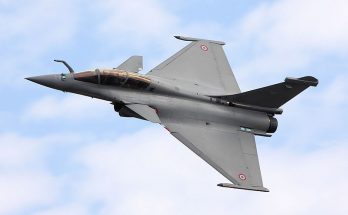
The House passed a series of supplemental foreign aid bills over the weekend that contain $95.3 billion in funding for Ukraine, Israel, and security in the Indo-Pacific. The move ends a prolonged standoff that began when the Biden administration first released its supplemental aid request back in October.
The Senate originally passed legislation in February that would have provided $95 billion in foreign aid, as well as $20 billion in domestic border security funding, but House Speaker Mike Johnson refused to bring the bill to a vote on the House floor due to resistance against Ukraine aid from segments of the Republican caucus. Johnson also tried to push through a standalone aid bill for Israel, but that legislation failed to pass. The White House had also threatened to veto any standalone bills that lacked funding for Ukraine.
The new House legislation would provide $60.8 billion for Ukraine, $26.4 billion for Israel, and $8.1 billion for Indo-Pacific security. When added to the $843.7 billion base budget enacted by Congress in March, the foreign aid would increase the total defense budget to around $939 billion in FY24. President Biden urged the Senate to quickly pass the legislation.
Once signed into law, the U.S. would be able to resume regular weapons deliveries to Ukraine, such as artillery, air defense equipment, anti-armor weapons, and unmanned aerial vehicles. Those shipments have largely been on hold since the start of the fiscal year in October.
The House released these highlights of the legislation:
The Ukraine Security Supplemental Appropriations Act, 2024
The bill totals $60.84 billion to address the conflict in Ukraine and assist our regional partners as they counter Russia, $23.2 billion of which will be used for replenishment of U.S. weapons, stocks, and facilities.
- $23.2 billion to replenish defense articles and defense services provided to Ukraine.
- $11.3 billion for current U.S. military operations in the region.
- $13.8 billion for the procurement of advanced weapons systems, defense articles, and defense services.
- $26 million to continue oversight and accountability of aid and equipment provided to Ukraine.
- Bolsters oversight through in-person monitoring requirements.
- Requires partners and allies to pay their fair share through cost-matching requirements.
- Mandates agreement on repayment for economic support by the government of Ukraine.
- Increases the fiscal limits on several Presidential drawdown authorities.
The Israel Security Supplemental Appropriations Act, 2024
The bill totals $26.38 billion to support Israel in its effort to defend itself against Iran and its proxies, and to reimburse U.S. military operations in response to recent attacks.
- $4 billion to replenish Iron Dome and David’s Sling missile defense systems.
- $1.2 billion for the Iron Beam defense system to counter short-range rockets and mortar threats.
- $3.5 billion for the procurement of advanced weapons systems, defense articles, and defense services through the Foreign Military Financing Program.
- $1 billion to enhance the production and development of artillery and critical munitions.
- $4.4 billion to replenish defense articles and defense services provided to Israel.
- $2.4 billion for current U.S. military operations in the region in response to recent attacks.
- Provides additional flexibility for transfers of defense articles to Israel from U.S. stockpiles held abroad.
- Prohibits funds to the United Nations Relief and Works Agency (UNRWA).
The Indo-Pacific Security Supplemental Appropriations Act, 2024
The bill totals $8.12 billion to continue efforts to counter communist China and ensure a strong deterrence in the region.
- $3.3 billion to develop submarine infrastructure, including investments in dry dock construction.
- $2 billion in Foreign Military Financing Program for Taiwan and other key allies and security partners in the Indo-Pacific confronting Chinese aggression.
- $1.9 billion to replenish defense articles and defense services provided to Taiwan and regional partners.
- $542 million to strengthen U.S. military capabilities in the region.
- $133 million to enhance the production and development of artillery and critical munitions.
- Provides additional flexibility for Foreign Military Financing loans and loan guarantees.
Shaun's deep-rooted interest in military equipment continues in his role as a senior defense analyst with a focus on the United States. He played an integral role in the development of Forecast International's U.S. Defense Budget Forecast, an interactive online product that tracks Pentagon acquisition programs throughout the congressional budget process. As editor of International Military Markets – North America, Shaun has cultivated a deep understanding of the vast defense markets in the United States and Canada. He is a regular contributor to Forecast International's Defense & Security Monitor blog and has co-authored white papers on global defense spending and various military programs.




